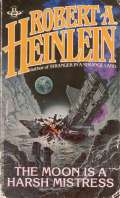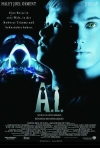AI & Sci-Fi, An Introduction
Science Fiction, or 'sci-fi', is a genre of fiction characterised by imaginary scientific discoveries or developments. As sci-fi generally involves a strong element of progressive science or technology, many sci-fi novels and films include advanced robotics and artificial intelligence. This frequently leads to the notion of this technology becoming evil and destructive, or surpassing the powers it was originally intended to possess – often turning on man, its naïve creator.

A perfect example of a popular sci-fi novel is Arthur C. Clarke's '2001: A Space Odyssey'. Clarke's novel contemplates the advantages and dangers of technological advancements, and through the murderous computer HAL indicates the potential problems of a machine that we ultimately cannot control. Another notable sci-fi author is Philip K. Dick, who wrote the hugely popular 'Do Androids Dream of Electric Sheep?'. In this story a squad of bounty hunters are given the task of 'retiring' rogue androids fast making their way towards Earth. The problem is that it's almost impossible to tell them apart from humans!
Isaac Asimov is also considered a master of sci-fi. His novel 'The Robots of Dawn' is set a millennium into the future, and tells the tale of a human detective working together with a humanoid robot to solve a bizarre case of roboticide. Asimov's work has also been used as the inspiration for a number of successful sci-fi films, for example 'I, Robot'. Asimov first published 'I, Robot' in 1950, and this was then used as the foundation of Will Smith's film of the same name. The film takes place in 2035, and follows the character of Del Spooner as he endeavours to discover the truth behind his friend's alleged suicide. He suspects that as robots attain an increasing number of human qualities, they have also gained the ability to kill their masters.

Harsh Mistress
Another 'great' of the sci-fi literary cannon is Robert A. Heinlein. His novel 'The Moon is a Harsh Mistress' is set against the backdrop of galactic revolution and focuses heavily on the character of Mike, a computer with a personality that mysteriously becomes devoted to revolutionary cause. Dan Brown's 'Digital Fortress' also has a computer at its heart, though this computer is 'TRANSLTR', a code-breaking supercomputer used by the National Security Agency. 'TRANSLTR' has never met a code it couldn't crack, yet is now faced with something so ingeniously complex that, if left unsolved, it could have devastating repercussions.
Sci-fi is also a popular cinematic genre, and perhaps the most famous sci-fi film is 'Star Wars'. Set in a far-away galaxy, 'Star Wars' tells the story of the evil Imperial Forces as they attempt to conquer the Galactic Empire. In this venture they capture Princess Leia, and it's Luke Skywalker, along with robotic duo R2-D2 and C-3PO, who rescues her, thus restoring justice in the Empire.

A more recent example of a sci-fi film is 'The Matrix'. 'The Matrix' presents humanity as being enslaved in a simulated reality by computers, and upon discovering this situation the protagonist, Neo, struggles to lead mankind to freedom. Like 'The Matrix', 'Terminator' also portrays machines as humanity's enemy. In this film an android is sent back from 2029 by machines intent on the destruction of humanity. His task is to kill Sarah Connor, whose unborn son will later lead a human revolt against machines.
Unlike many sci-fi films, 'A.I.' doesn't present androids as being the adversary of humanity, but rather sympathetically depicts David, an android child with the capacity to love. After being cast-out by his human parents, David searches desperately for something that will make him 'real' in the hope that his will encourage his 'mother' to love him.
| Project Acuitas by WriterOfMinds (General Project Discussion) |
| Requirements for functional equivalence to conscious processing? by DaltonG (General AI Discussion) |
| Will LLMs ever learn what is ... is? by HS (Future of AI) |
| Who's the AI? by frankinstien (Future of AI) |
| Ai improving AI by infurl (AI Programming) |
| Atronach's Eye by WriterOfMinds (Home Made Robots) |
| Running local AI models by spydaz (AI Programming) |
| Hi IM BAA---AAACK!! by MagnusWootton (Home Made Robots) |
| LLaMA2 Meta's chatbot released by spydaz (AI News ) |
| ollama and llama3 by spydaz (AI News ) |
| AI controlled F-16, for real! by frankinstien (AI News ) |
| Open AI GPT-4o - audio, vision, text combined reasoning by MikeB (AI News ) |
| OpenAI Speech-to-Speech Reasoning Demo by MikeB (AI News ) |
| Say good-bye to GPUs... by MikeB (AI News ) |
| Google Bard report by ivan.moony (AI News ) |
| Elon Musk's xAI Grok Chatbot by MikeB (AI News ) |
Most Online Today: 453. Most Online Ever: 2369 (November 21, 2020, 04:08:13 pm)
